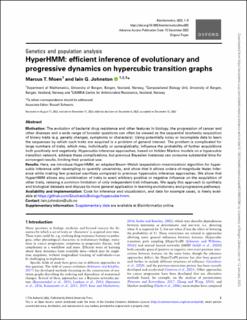| dc.description.abstract | Motivation: The evolution of bacterial drug resistance and other features in biology, the progression of cancer and other diseases and a wide range of broader questions can often be viewed as the sequential stochastic acquisition of binary traits (e.g. genetic changes, symptoms or characters). Using potentially noisy or incomplete data to learn the sequences by which such traits are acquired is a problem of general interest. The problem is complicated for large numbers of traits, which may, individually or synergistically, influence the probability of further acquisitions both positively and negatively. Hypercubic inference approaches, based on hidden Markov models on a hypercubic transition network, address these complications, but previous Bayesian instances can consume substantial time for converged results, limiting their practical use.
Results: Here, we introduce HyperHMM, an adapted Baum–Welch (expectation–maximization) algorithm for hypercubic inference with resampling to quantify uncertainty, and show that it allows orders-of-magnitude faster inference while making few practical sacrifices compared to previous hypercubic inference approaches. We show that HyperHMM allows any combination of traits to exert arbitrary positive or negative influence on the acquisition of other traits, relaxing a common limitation of only independent trait influences. We apply this approach to synthetic and biological datasets and discuss its more general application in learning evolutionary and progressive pathways.
Availability and implementation: Code for inference and visualization, and data for example cases, is freely available at https://github.com/StochasticBiology/hypercube-hmm. | en_US |

